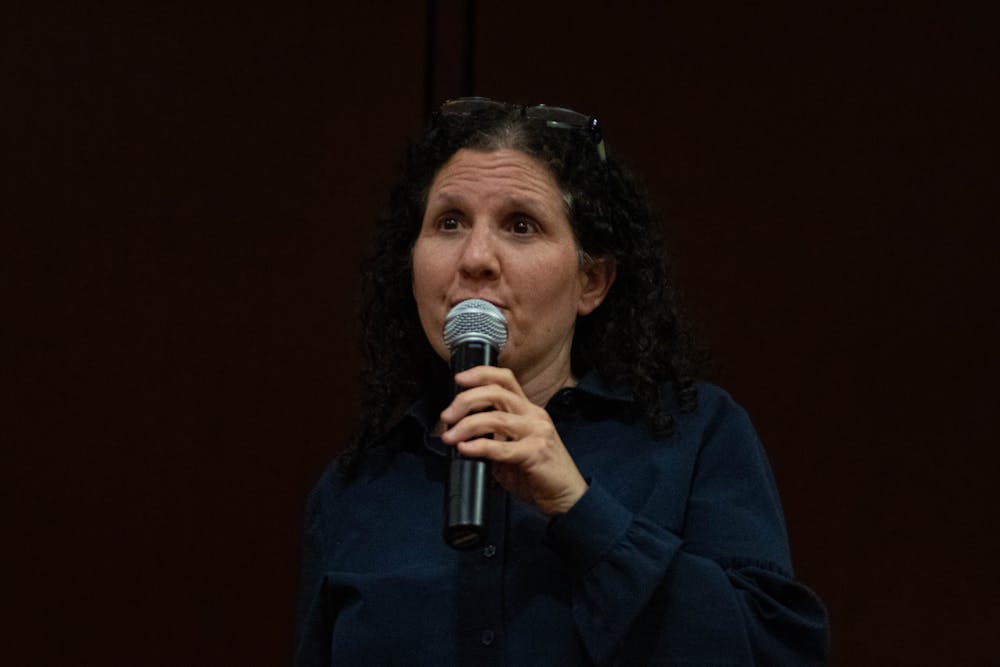When the U.S. invaded Afghanistan in 2001, Ahmed Abdullah Al Fadaam, Elon University professor of communication design, lived with his wife and two children in Baghdad. He suspected Iraq would be next.
Then in 2003, a mortar shell — an explosive weapon — fell in their neighbor’s yard, making his prediction a reality.
“We were expecting all great things to happen to Iraq. ‘We are going to be treated like state 51. The Americans will bring all of their companies, all of their technologies to rebuild the country for us,’” Faddam said. “But then mistakes started to happen. It seems that the United States is good at going to war, but not so good at running the aftermath.”
Fadaam told his story in the film “Baghdad Graphic,” directed by his colleague, Douglas Kass, Elon professor of cinema and television arts. Fadaam narrates the film, overlaid by pictures he drew of his own experience. The short film was previewed at Elon during a panel discussion March 21.
The panel was held in remembrance of the 20th anniversary of the U.S. invasion of Iraq — which began an eight-year military conflict between the two countries.
Elon’s international global studies, political science and peace and conflict studies departments co hosted the event to bring historical context to the invasion, dissect the decisions of international leaders and make sense of the aftermath of the war. Fadaam spoke alongside professors of political science and policy studies Baris Kesgin, Jason Kirk and Safia Swimelar.
Kesgin said it is important to look at the specific decision-makers involved in the conflict and what motivated them when they invaded Iraq. He called attention to examining the internal biases of international leaders at the time of the invasion, such as former British Prime Minister, former U.S. President George W. Bush and former U.S. Secretary of Defense Donald Rumsfeld.
“How do individuals see the world? How do they really define a problem? How do they interact with each other?” Kesgin said. “How do leaders perceive various different variables that are in place like public opinion?”
Swimelar focused on the consequences of invading Iraq. She said she turned to Brown University’s Cost of War project to understand the human, moral and reputational cost of the war.
“We owe it to ourselves as Americans and humans to understand that a lot of crimes were committed in this war,” Swimelar said. “A lot of civilian harm and long-term trauma and war crimes.”
Swimelar said detainees at the Iraqi prison Abu Ghraib were mocked by members of the U.S. Army. One image Swimelar projected showed a man lying on the ground with a rope wrapped around his neck, and a U.S. soldier holding the rope like a leash.
As human rights violations continued, Fadaam decided to do his part in informing the public about the war. He worked for media outlets, including the New York Times, translating and reporting from Iraq. Fadaam said as the war dragged on, his standards of living continued to drop.
“I don't need electricity. I don't need water. I don't need schools. I don't need hospitals. I don't need medicine,” Fadaam said. “I just need to have some sense of safety, of security, because we were surrounded with death 24 hours a day.”
There were about 45 students and faculty in attendance at the panel, one of which was Elon freshman Rocco Albano. The international global studies student said he enjoyed the discussion because it gave him the chance to learn about a part of history he was too young to remember.
“I have no memory of this, but it is something my parents remember and something that they’ve talked about,” Albano said. “Those are things I have no memories of that are still shaping current electoral politics today.”
Making sense of electoral politics in the U.S. and the Middle East is what Albano wants to learn while at Elon. He said listening to this panel was one step in deepening his understanding.
According to the panelists, the reasons for the invasion are complicated. But Fadaam is certain about one thing.
“The victim was the Iraqi people,” he said.


